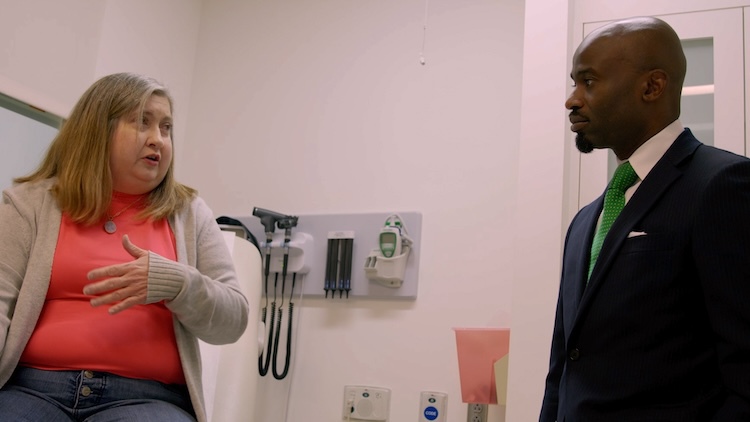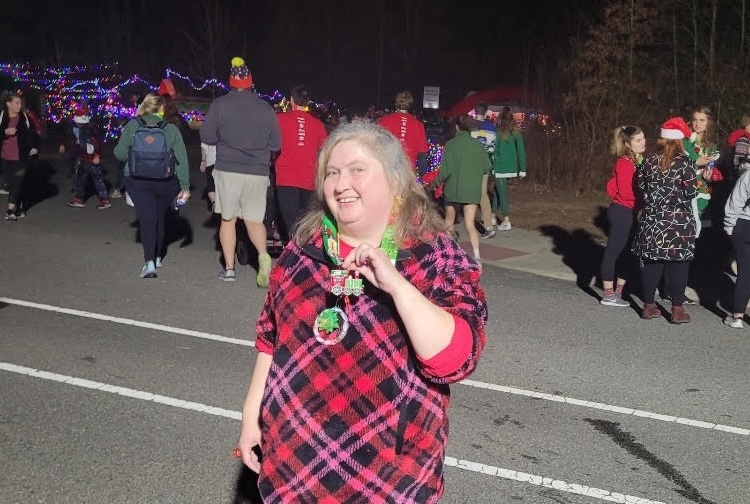
Rare dual transplant gives longtime VCU Health patient newfound freedom
Strong collaboration between Hume-Lee Transplant Center and Pauley Heart Center highlights the undeniable proof that team members are pursuing innovative methods to improve patient care at VCU Health.
February 20, 2024.ashx) VCU Health care teams pursued a complicated operation in hopes of helping longtime patient Liz Moore live her best life. (VCU Enterprise Marketing and Communications)
VCU Health care teams pursued a complicated operation in hopes of helping longtime patient Liz Moore live her best life. (VCU Enterprise Marketing and Communications)
By Michael Phillips and Sara McCloskey
Liz Moore took a trip to Asheville at the end of 2023, enjoying a life of freedom once considered out of reach.
Moore was born with a congenital heart defect, and while a surgery known as a Fontan provided her with a temporary reprieve, doctors at VCU Health’s Pauley Heart and Hume-Lee Transplant centers advised her that, ultimately, she would need a heart transplant.
However, Moore's surgery was complicated because her heart failure had caused her liver to fail, too. To survive, she would need both a heart and liver transplant.
Josue Chery, M.D., the surgical director of heart transplant who assisted with Moore’s heart transplant, says the procedure is so risky that most transplant centers won't authorize it.
"Most don't want to take the risk because it's just a lot easier to not have to take it," Chery said. "But on the flip side of that coin, these patients don't have any other options. So, you have to have centers like Hume-Lee that are realistic and say, ‘Yes.’ We know all the different things that can happen, but we're willing to take the risk and try to get the best outcome possible."
“This is a testament to coordination of care. From early identification to skilled surgical intervention, to a patient and her family trusting our teams... it's a long, long journey and a really remarkable outcome.
Keyur Shah, M.D., VCU Health Pauley Heart Center
Moore is no stranger to VCU Health, having visited providers at the health system since she was a teenager. For the dual transplant, team members from Hume-Lee Transplant Center and Pauley Heart Center closely collaborated to craft a plan that would give her a chance to live her best life going forward.
"They advocated for me to get the transplant and they have been so wonderful to work with," Moore said. "I know not that many dual transplants are done every day. All of the doctors would check on me all of the time... I'm so glad they're here."
Aamir Khan, M.D., estimates that VCU Health surgeons perform around five dual transplants a year. Nationally, 79 were performed in 2022, a number that has risen over the past decade thanks to innovations in preserving organs while the patient travels to the operating room.
“There are very few centers in the nation that have the capability or the expertise to do simultaneous heart and liver [transplants],” Khan said. “That’s pretty unique to Hume-Lee.”
And there are not many centers in the United States that transplant as many patients as Hume-Lee's heart transplant program, which is ranked in the top 20th percentile in the United States by the Organ Procurement and Transplant Network, making VCU Health a place where the possibilities are unlimited because of team members’ expertise and their devotion to exceptional patient care.
'A desire to live'
Typically, people have two ventricles in the heart that pump oxygenated blood to the lungs and body. Moore was born with a single ventricle. She says she was never able to participate in activities like gym class as a child because of it.
Moore has been a VCU Health patient since she was 15 years old and has had several operations here, including her Fontan surgery when she was in college. The procedure is performed on patients at a very young age when one ventricle of the heart is too small. Because only one chamber is working, under-oxygenated blood flows into the body, leading to numerous health issues. After a Fontan surgery, a single ventricle can pump only oxygenated blood to the lungs and body.
But as the years go by, the fix becomes less effective. Recognizing how Fontan surgery is “a treatment and not a cure,” Moore noticed the procedure’s benefits were wearing off after about 15 to 20 years. She developed irregular heartbeats, called atrial fibrillation or AFib for short. The right and left sides of her heart were also failing.
Moore’s care team from the Adult Congenital Heart Disease program at Pauley Heart Center advised her that she would need a heart transplant.
“You want to have the best longevity that you can obtain. VCU Health has every sub-specialty needed to care for an adult congenital patient,” said Sangeeta Shah, M.D., FACC, FASE, medical director of the Adult Congenital Heart Disease program.
Josue Chery, M.D., VCU Health’s surgical director of heart transplant, assisted with Liz Moore’s dual heart and liver transplants. (VCU Enterprise Marketing and Communications)
Moore’s liver also needed to be transplanted, adding to the complications of the surgery.
“Once you start seeing evidence of organs being damaged, like the liver in this case, and more commonly the kidney, there are things we can do to measure and have an estimate of survival,” said Keyur Shah, M.D., chief of heart failure at VCU Health Pauley Heart Center. “Considering the complexity of what was going on, with multiple organs involved, this is something we started preparing for well in advance."
At Hume-Lee Transplant Center, Chery says working with high-risk patients is something surgical teams don't shy away from, even if that means creating a plan for a case as unique as Moore's, where the heart and liver were transplanted simultaneously.
The benefits on the other hand can be transformational, he says.
"What I noticed in Ms. Moore was a desire to live," Chery said. "She's had multiple surgeries to fix the problems of her heart. And over the years, despite the prior surgeries that she had, the heart continued to fail.”
After many conversations, Chery says the care team assured Moore that they would be able to provide these life-saving measures – noting the importance of the trust formed between the patient and care team.
Experts from both centers gathered for extensive pre-planning, and the resulting plan was an elaborate one that called for round-the-clock care during and immediately after the transplant.
Living life to the fullest after a dual-organ transplant
The surgery was not easy, due to Moore’s prior surgeries and the anatomy of her heart. Physicians, nurses and support staff stayed by Moore’s bedside for days to ensure her body would accept the new heart and liver.
Because of the complexity of the procedures and complications, Khan noted the surgical site had to be closely monitored for more than 24 hours.
“It was a tough post-operation course,” he said. “And she still made it. I can’t tell you how happy I was.”
While recovering at the hospital, patients and caregivers learn about their new medications, steps to stay healthy post-transplant and important symptoms to watch out for, such as fevers or infections. Their VCU Health care team is also on-call should transplant patients need any help.
After recovering from surgery, Liz Moore was able to participate in a local Tacky Light Run. (Contributed by Liz Moore)
Patients are also learning to live with a new normal after such a major surgery. Team members hope that means patients, like Moore, are listening to their body and feeling much better too.
The dual-organ transplant provided a dramatic increase in quality of life for Moore. She’s now doing things she never imagined — traveling, exercising and adopting a foxhound.
"It was a scary experience, but after the recovery, it's so worth it to be able to see your family and do whatever you want as a normal person," she said. "Obviously there are still things I have to monitor, but just to be able to live my life every day is great."
This operation is also the latest evolution of a decades-long commitment to patients at Hume-Lee Transplant Center and Pauley Heart Center, highlighting the undeniable proof that team members are pursuing innovative methods to improve patient care at VCU Health.
“This is a testament to coordination of care,” Keyur Shah said. “From early identification to skilled surgical intervention, to a patient and her family trusting our teams while also focusing on her own rehabilitation afterwards — it's a long, long journey and a really remarkable outcome.”





